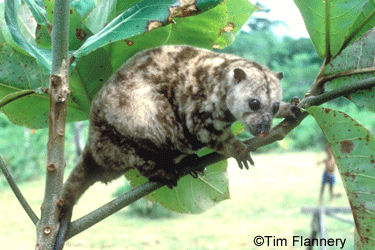The EDGE Team has just received an urgent memo from concerned researchers working on Woodlark Island (Muyuw) in the Milne Bay Province of Papua New Guinea. The government of Woodlark Island has recently granted permission to Vitroplant Limited to convert 60,000 hectares of the island into oil palm plantations. This is catastrophic news as the island itself is only 85,000 hectares in total. Leases for the oil palm project will cover almost the entire eastern half of Woodlark island, as well as large a proportion of the western half.
These disastrous developments would not only have devastating effects on the environment and forest eco-systems but could potentially have dire consequences for the endemic Woodlark Cuscus (Phalanger lullulae) as the eastern side of the island is the stronghold for Woodlark cuscus populations.

The Woodlark Cuscus (Phalanger lullulae) is a medium sized marsupial that is highly adapted to arboreal life. A modified long prehensile tail with a naked end assists in gripping branches and facilitates locomotion through the forest canopy. The Woodlark cuscus is a solitary species, sleeping during the day in tree hollows and coming out at night to forage in the tropical forests.
Although considered Least Concern on the IUCN RED List due to its moderate abundance in the eastern part of the island, this species is potentially extremely vulnerable due to its limited range. Habitat modifications would have severely detrimental effects on this population and could lead to local extinctions. The Woodlark cuscus is extremely evolutionarily distinct, and if it became critically endangered it would be high on the EDGE Top 100 mammal list. Considered a flagship of endemic animals in the Milne Bay Province, the Woodlark cuscus desperately needs concerted conservation efforts to ensure its survival.
Watch this space for information on how you can make a difference to ensure the Woodlark Cuscus and other endangered species on Woodlark Island are preserved…..